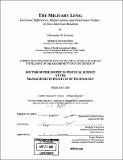The military lens : doctrinal differences, misperception, and deterrence failure in Sino-American relations
Author(s)
Twomey, Christopher P
DownloadFull printable version (22.62Mb)
Other Contributors
Massachusetts Institute of Technology. Dept. of Political Science.
Advisor
Stephen Van Evera.
Terms of use
Metadata
Show full item recordAbstract
Nations, because of their different strategic situations, histories, and military cultures can have dramatically different beliefs about the nature of effective military doctrine, strategy, and capabilities. This dissertation argues that when such doctrines-or "theories of victory"-differ across states, misperceptions and false optimism are likely to occur. In turn, these can impede international diplomacy and statecraft by making communication and common assessments of the balance of power more difficult. When states are engaged in strategic coercion--either deterrence or compellence--these problems can lead to escalation and war. To develop this unique explanation for the pernicious problem of false optimism, this dissertation draws on scholarship on the sources of doctrine, strategic culture, misperception, strategic coercion, and deterrence theory. It assesses the argument through case studies of attempts at strategic coercion in early Cold War Sino- American conflicts in Korea and the Taiwan Strait. The dissertation also tests the proposed theory against the conventional approach of deterrence theory that focuses on the "objective" quality of the signaling. The cases rely on process tracing using both primary and secondary sources from each side, and they support the dissertation's proposed theory in broad terms as well as in their details. The two attempts of deterrence surrounding the Korean War failed. There, the signaling between the two great powers depended heavily on each side's own doctrinal theory of victory. (cont.) These different doctrinal lenses further impeded the conduct of diplomacy between the two by blurring the interpretation of those signals as well as the overall assessment of the balance of power. In the third case (deterring conflict in the Taiwan Strait), the two sides had much more similar theories of victory, and misperception and conflict were avoided. By providing a unique analytic perspective on military capability, this dissertation suggests policymakers need to carefully consider the perceptual framework regarding military doctrine of those they are trying to influence.
Description
Thesis (Ph. D.)--Massachusetts Institute of Technology, Dept. of Political Science, February 2005. Vita. Includes bibliographical references (p. [367]-405).
Date issued
2005Department
Massachusetts Institute of Technology. Department of Political SciencePublisher
Massachusetts Institute of Technology
Keywords
Political Science.